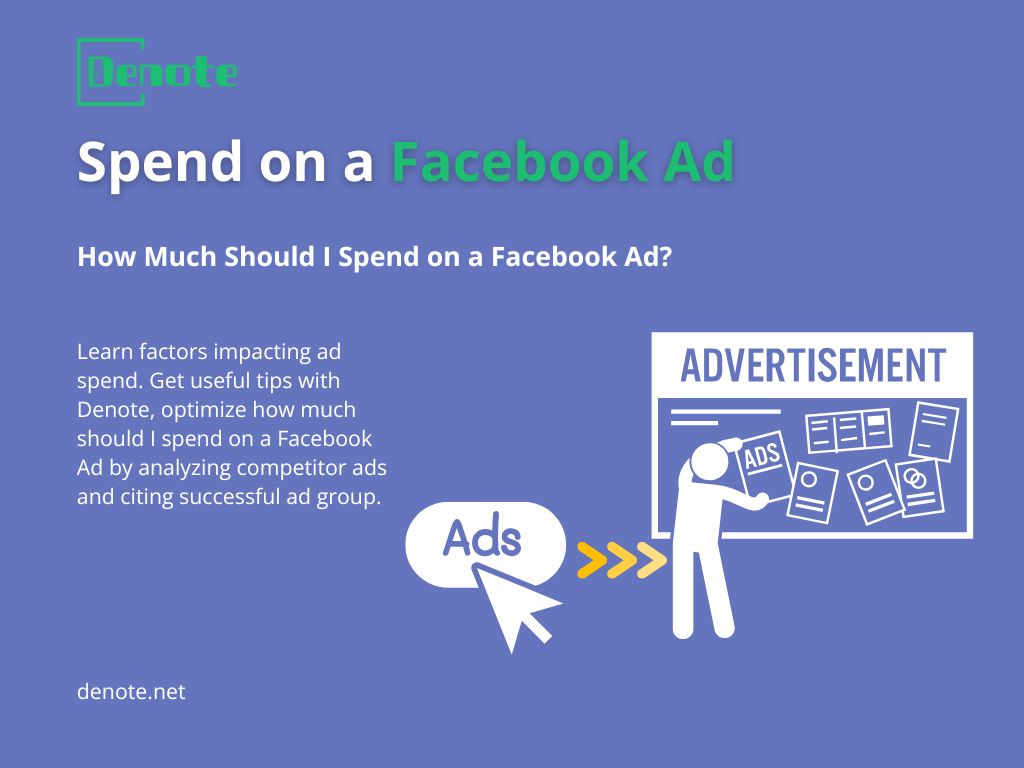In the dynamic landscape of digital marketing in 2025, one question that constantly lingers in the minds of marketers and business owners is, “how much should I spend on a Facebook Ad?” Facebook, with its vast user base and powerful advertising capabilities, remains a cornerstone of many marketing strategies. However, determining the right amount to invest in Facebook ads can be a complex and challenging task. This blog post aims to shed light on this crucial aspect of Facebook advertising, exploring various factors that influence ad spend and providing practical tips on how to optimize your investment.
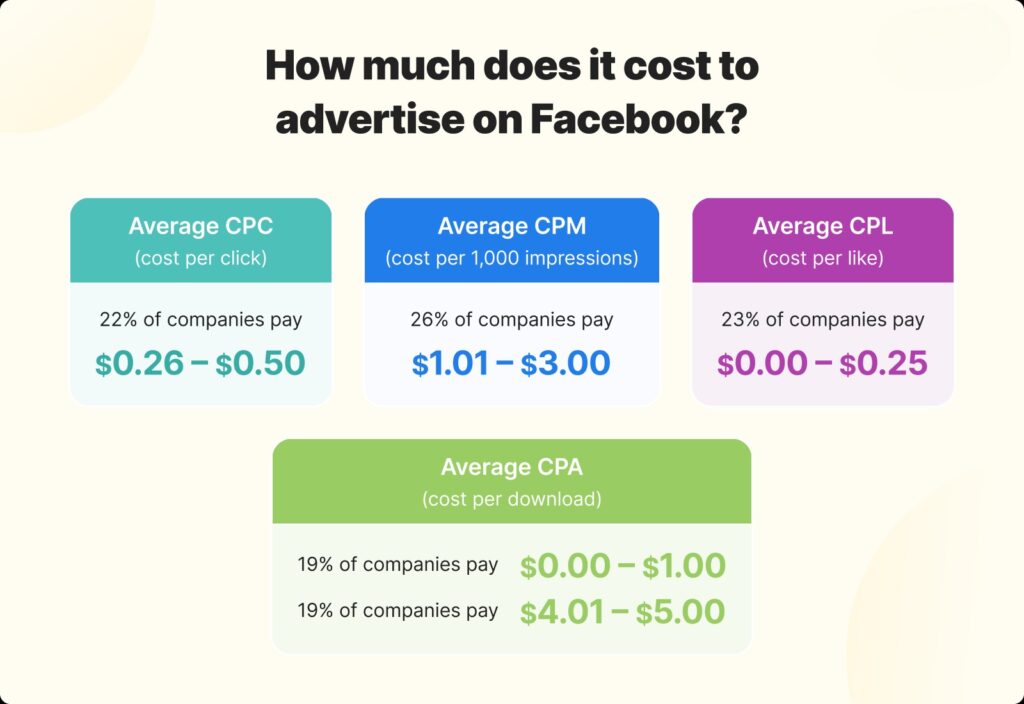
What Is Facebook Ad Spend?
Facebook ad spend refers to the total amount of money you allocate to run advertisements on the Facebook platform. This includes all the costs associated with creating, targeting, and displaying your ads to the desired audience. It encompasses expenses for reaching different demographics, ad placements across various Facebook-owned properties such as Facebook, Instagram, Audience Network, and Messenger, and the duration for which your ads are shown. But how much should I spend on a Facebook Ad to ensure it effectively reaches my target audience and achieves my marketing goals?
Understanding your Facebook ad spend is the first step towards managing your advertising budget efficiently. It allows you to track your expenses, measure the return on investment (ROI), and make informed decisions about future campaigns. By knowing exactly how much you are spending on each ad campaign, you can assess its performance and determine whether it is delivering the desired results. Whether you are a small business owner looking to increase brand awareness or a large corporation aiming to drive sales, having a clear understanding of your ad spend is essential for success.

How Are Facebook Ad Costs Calculated?
Facebook uses a sophisticated algorithm to calculate ad costs, taking into account multiple factors. One of the primary determinants is the bidding system. When you create a Facebook ad campaign, you have the option to set a bid amount, which represents the maximum amount you are willing to pay for a specific action, such as a click (CPC - Cost Per Click), a thousand impressions (CPM - Cost Per Mille), or a conversion. The actual cost you pay, however, may be lower than your bid, depending on the competition for the ad placement and the quality of your ad.
Another factor that influences ad costs is the target audience. Facebook allows you to target specific demographics, interests, behaviors, and locations. The more precise and competitive your target audience is, the higher the ad costs are likely to be. For example, if you are targeting a niche audience with high purchasing power, you may need to pay more to reach them compared to a broader audience. Additionally, the time of year, day, and even the specific ad placement can also impact costs. But still, the question remains: how much should I spend on a Facebook Ad to get the best results within my budget?
The quality of your ad also plays a significant role in cost calculation. Facebook rewards ads that are relevant, engaging, and provide value to the users. Ads with high-quality images, compelling copy, and a clear call-to-action are more likely to receive higher engagement rates, which can result in lower costs per action. On the other hand, low-quality ads that are spammy or unappealing may face higher costs and lower performance. Therefore, it is crucial to invest time and effort in creating high-quality ads that resonate with your target audience.
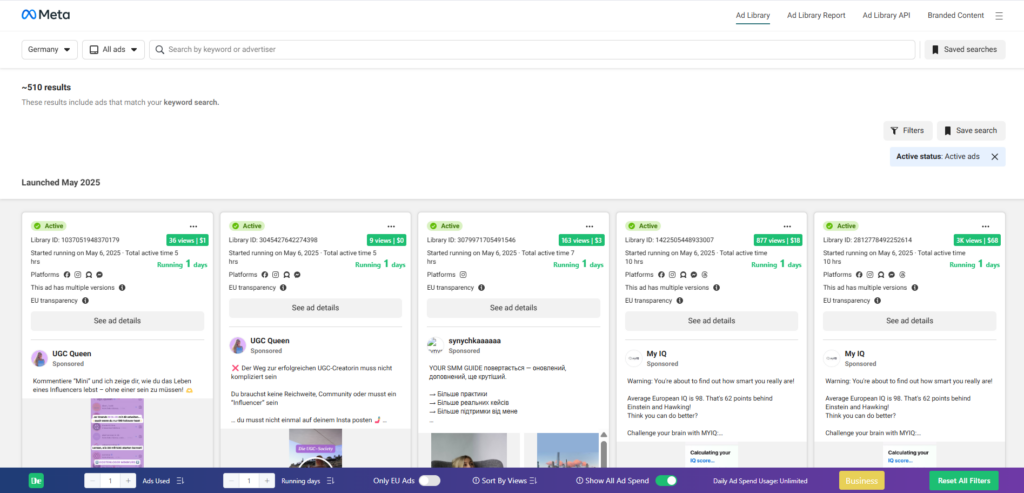
Key Factors Influencing Spend on a Facebook Ad
Industry Benchmarks and Audience Size
Industry benchmarks can serve as a useful reference point when determining how much should I spend on a Facebook Ad. Different industries have varying levels of competition and customer acquisition costs.
Campaign Objectives and Placement
Your campaign objectives play a crucial role in determining how much you should spend on a Facebook Ad. Whether your goal is to increase brand awareness, drive website traffic, generate leads, or boost sales, each objective requires a different approach and budget allocation. For example, if your objective is to increase brand awareness, you may focus on reaching a large audience with a lower cost per impression (CPM). On the other hand, if your goal is to drive conversions, you may be willing to pay more per click (CPC) to target a more qualified audience.
Bidding Strategy and Ad Quality
Your bidding strategy can significantly impact your ad spend. Facebook offers different bidding options, such as automatic bidding, manual bidding, and target cost bidding. Automatic bidding allows Facebook to optimize your bids to get the best results within your budget. Manual bidding gives you more control over the bid amount but requires more monitoring and adjustment. Target cost bidding allows you to set a specific cost per action you want to achieve. Choosing the right bidding strategy depends on your campaign objectives, budget, and level of expertise.
Optimize Spend on a Facebook Ad with Denote
Expand Ad Spend Insights with Denote
Denote is a powerful tool that can help you expand your insights into advertising expenditure and make more informed decisions about "how much should I spend on Facebook ads". It provides detailed analysis and reports on the advertising campaigns in the Facebook Ad Library, allowing you to conduct real-time analysis of the impressions, advertising expenditure, duration of ads, and the number of times ads are repeatedly run by your competitors. With Denote, you can gain a deeper understanding of the performance of ads and identify the best ads.
For example, Denote can show you which ads can bring the most impressions at the lowest cost, enabling you to recognize the effectiveness of outstanding ad creatives and avoid underperforming advertising campaigns. It allows you to make adjustments or pause them to prevent wasting the budget. By leveraging the insight function provided by Denote, you can optimize your advertising expenditure and achieve better results from your Facebook advertising campaigns.
You just need to download the Denote Google Extension(https://chromewebstore.google.com/detail/denote-save-ads-tk-fb-ad/okieokifcnnigcgceookjighhplbhcip?hl=en-US&utm_source=ext_sidebar) and install it, and then you can achieve all of this. Specifically, you can check our tutorial on how to use the extension.
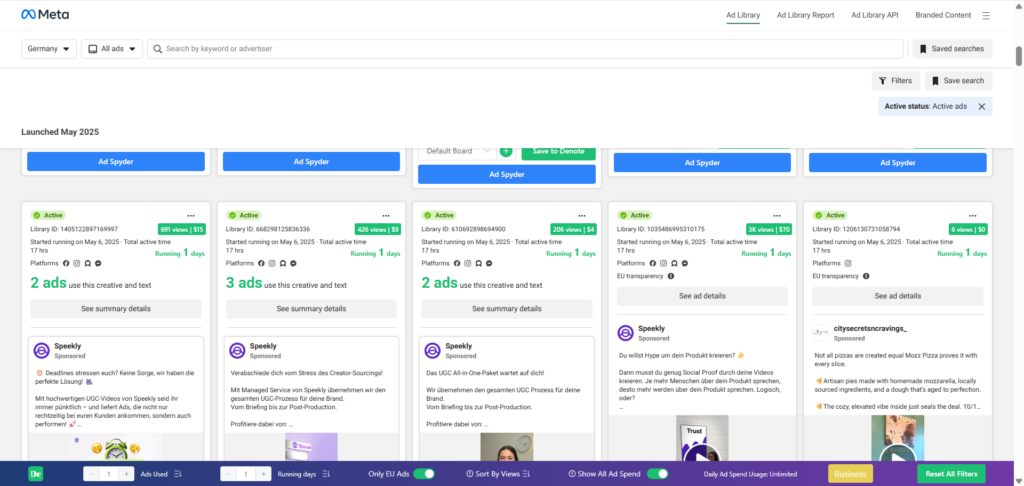
Track Your Competitor with Denote
In addition to providing insights into your own ad campaigns, Denote also allows you to track your competitors' Facebook advertising activities. By monitoring your competitors' ad spend, ad creatives, and targeting strategies, you can gain valuable insights into their marketing tactics and identify opportunities to differentiate your brand.
For instance, you can see which keywords and interests your competitors are targeting, the types of ads they are running, and the frequency of their ad campaigns. This information can help you refine your own targeting strategy, create more compelling ad creatives, and stay ahead of the competition. By understanding what your competitors are doing, you can make more informed decisions about how much should I spend on a Facebook Ad to effectively compete in the market.
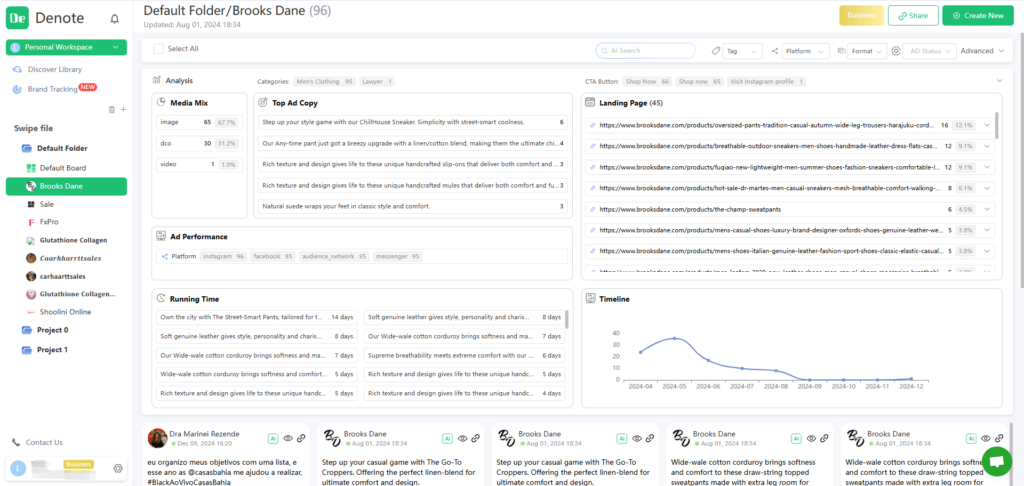
Identify High-Performing Ads
Denote's advanced analytics capabilities enable you to identify high-performing ads within your Facebook ad campaigns. It uses machine learning algorithms to analyze large amounts of data and identify patterns and trends that indicate ad performance. By identifying high-performing ads, you can replicate their success and scale up your advertising efforts.
For example, Denote can analyze the elements of high-performing ads, such as the ad copy, images, call-to-action, and targeting, and provide recommendations on how to optimize your other ads. It can also help you identify the best times and days to run your ads, the most effective ad placements, and the optimal budget allocation for each ad set. By leveraging these insights, you can maximize the return on your ad spend and achieve better results from your Facebook advertising campaigns.
How to Calculate Spend on a Facebook Ad
CPC, CPM, and ROAS
To effectively calculate how much should I spend on a Facebook Ad, it is essential to understand key metrics such as CPC, CPM, and ROAS. CPC (Cost Per Click) is the amount you pay each time a user clicks on your ad. It is calculated by dividing the total cost of your ad campaign by the number of clicks. CPM (Cost Per Mille) is the cost you pay for every thousand impressions of your ad. It is calculated by dividing the total cost of your ad campaign by the number of impressions and multiplying by 1000. ROAS (Return on Ad Spend) measures the revenue generated for every dollar spent on advertising. It is calculated by dividing the total revenue generated by the ad campaign by the total ad spend.
By monitoring these metrics, you can evaluate the performance of your Facebook ad campaigns and determine whether you are getting a good return on your investment. For example, if your CPC is too high, it may indicate that your targeting is not precise enough or that your ad creative is not compelling enough. If your ROAS is low, it may suggest that you need to optimize your ad campaign or adjust your budget allocation. Understanding these metrics and how they relate to your ad spend is crucial for making informed decisions and optimizing your Facebook advertising strategy.
Setting Budgets: Daily vs. Lifetime
When setting a budget for your Facebook ad campaigns, you have the option to choose between a daily budget and a lifetime budget. A daily budget is the maximum amount you are willing to spend on your ad campaign per day. Facebook will automatically adjust your ad delivery to ensure that your daily budget is not exceeded. A lifetime budget, on the other hand, is the total amount you are willing to spend on your ad campaign over its entire duration. Facebook will optimize your ad delivery to spend your lifetime budget evenly over the specified period.
The choice between a daily budget and a lifetime budget depends on your campaign objectives, budget constraints, and advertising strategy. If you want more control over your daily ad spend and want to ensure that your budget is evenly distributed over time, a daily budget may be a better option. If you have a specific goal or event in mind and want to allocate a fixed amount of budget for the entire campaign, a lifetime budget may be more suitable. It is important to carefully consider your options and choose the budget type that aligns with your goals and budget.
Budget Breakdown for Different Campaigns
Different types of Facebook ad campaigns require different budget allocations. For example, a brand awareness campaign may require a larger budget to reach a wider audience and generate more impressions. A lead generation campaign, on the other hand, may focus on targeting a more qualified audience and may require a higher budget per lead. A sales campaign may prioritize driving conversions and may allocate a significant portion of the budget to high-performing ad sets and placements.
To create an effective budget breakdown for your Facebook ad campaigns, it is important to clearly define your campaign objectives, target audience, and desired outcomes. Based on these factors, you can allocate your budget to different ad sets, placements, and targeting options. It is also important to regularly review and adjust your budget based on the performance of your campaigns. By carefully planning and managing your budget, you can ensure that you are spending your money effectively and achieving the best possible results from your Facebook advertising efforts.
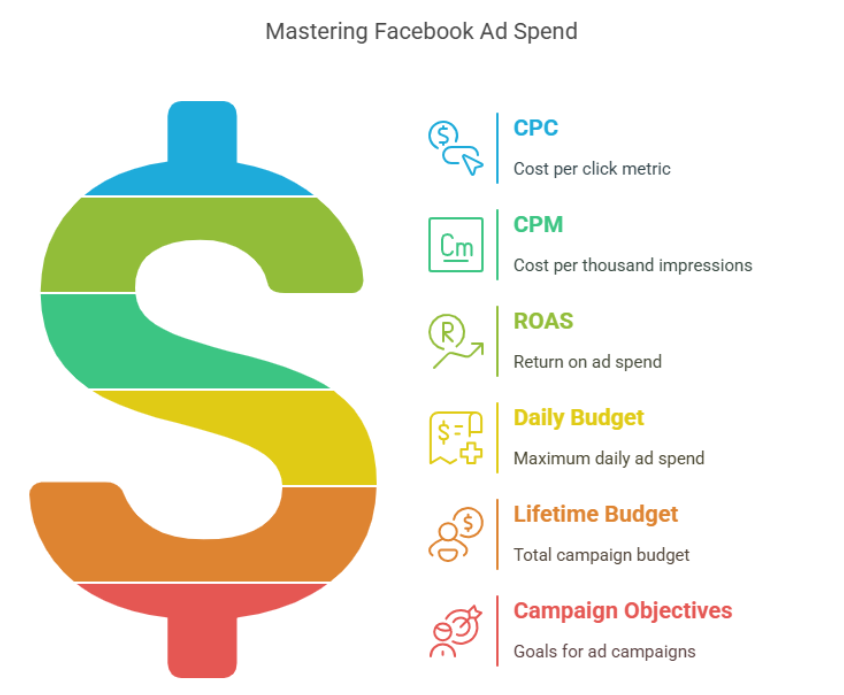
Conclusion: Let Denote Help You Know How Much Should I Spend on a Facebook Ad
In conclusion, determining how much should I spend on a Facebook Ad is a complex decision that requires careful consideration of various factors. By understanding the concepts of ad spend, cost calculation, key influencing factors, and optimization strategies, you can make more informed decisions and allocate your budget effectively. Tools like Denote can provide valuable insights and analytics to help you optimize your ad spend, track your competitors, identify high-performing ads, and create cost-effective campaigns.
Remember, Facebook advertising is not a one-size-fits-all approach. It requires continuous testing, optimization, and adaptation to achieve the best results. By staying updated on the latest trends and best practices in Facebook advertising, leveraging data-driven insights, and being willing to experiment, you can maximize the return on your ad spend and drive the growth of your business in 2025 and beyond. So, start using Denote today and take your Facebook advertising to the next level!
If you have any questions, please refer to our user guide:https://denote.net/blog/how-to-use-denote
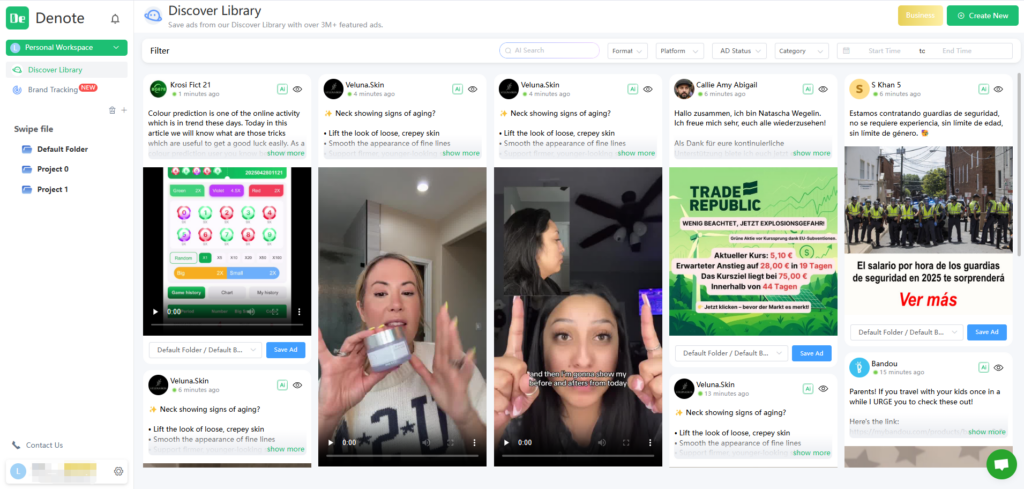
.jpg)
